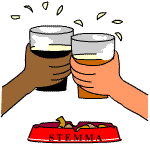Beer
Created | Updated Jan 9, 2012

This fizzy drink has been voted more popular than water in some parts of the world, as well as more useful. In fact, some people say that if water tasted like beer, they would drink more water. Not that they drink it for its flavour, but rather for what it does to their brain cells, i.e., kills them. This, they argue, is one of the many advantages beer has over water.
How one drinks it, and in what quantities, is more or less a case of cultural relativism. Americans take it in bottles or cans; the British take it in pints; the Germans take it in litres and so on. Of course, it makes no difference, as the final result is always the same, with lots of singing, lots of stumbling, lots of eating, lots of regurgitating and lots of sleeping, normally in that order.
There are, however, two disadvantages, in that the more beer one drinks, the more one wishes it tasted like water; and furthermore, the amount of beer drunk in an evening is in direct proportion to the amount water drunk the following morning. It is also the cause of terrible headaches and the abominable cotton mouth - fortunately there are a number of known hangover cures.
Many of us drink beer. Many of those who drink beer also have a favourite pint and a favourite pub to sit and drink it in. But what is beer?
Beer is a generic term used to describe a number of alcoholic beverages. Within this group are such fine thirst quenchers as ales, lagers and porters and stouts. These different varieties are often more commonly known as bitter, lar-gur and Guinness.
A Brief History of Beer
Beer has been made for centuries. The Egyptians used to drink it. Some historians say that the reason why ancient people around the Nile and Euphrates changed lifestyle from being nomadic to adopting a more settled, agricultural existence, was because they wanted to grow grain - not for bread, but for beer. In fact, archaeo-botanist, Dr Delwen Sumnel, found traces of malted grain on one Egyptian excavation and with the help of brewer Scottish Courage, produced an approximation of an Egyptian beer. Records say that Egyptian beer was as thick as porridge and as strong as whisky, and Sumnel's version was a lot clearer and weaker than the beer produced in Ancient Egypt, it's an interesting exercise nonetheless.
Beer Around the Globe
Almost every country seems to have developed its own version of beer and every district its own variety. The climate affects the way the beer is brewed and consequently affects the end product. The wetter the nation, the darker and heavier-bodied the drink. A good example of this observation is Ireland's national drink, Guinness.
Some nations were more famed for their drinking than others, the Vikings being probably the most renowned for their imbibing. There is a lot of national pride in producing beer, with each country claiming that theirs are the best. High among the candidates for producers of the best beer is Belgium, where almost every beer has its own glass style to accompany it. Germany protects its image as a nation of great brewers with purity laws, which guarantee the quality of the beer produced within its borders. Around the globe though, there are a lot of laws relating to beer, some sensible, some curious, some confusing and some that are just down right silly.

